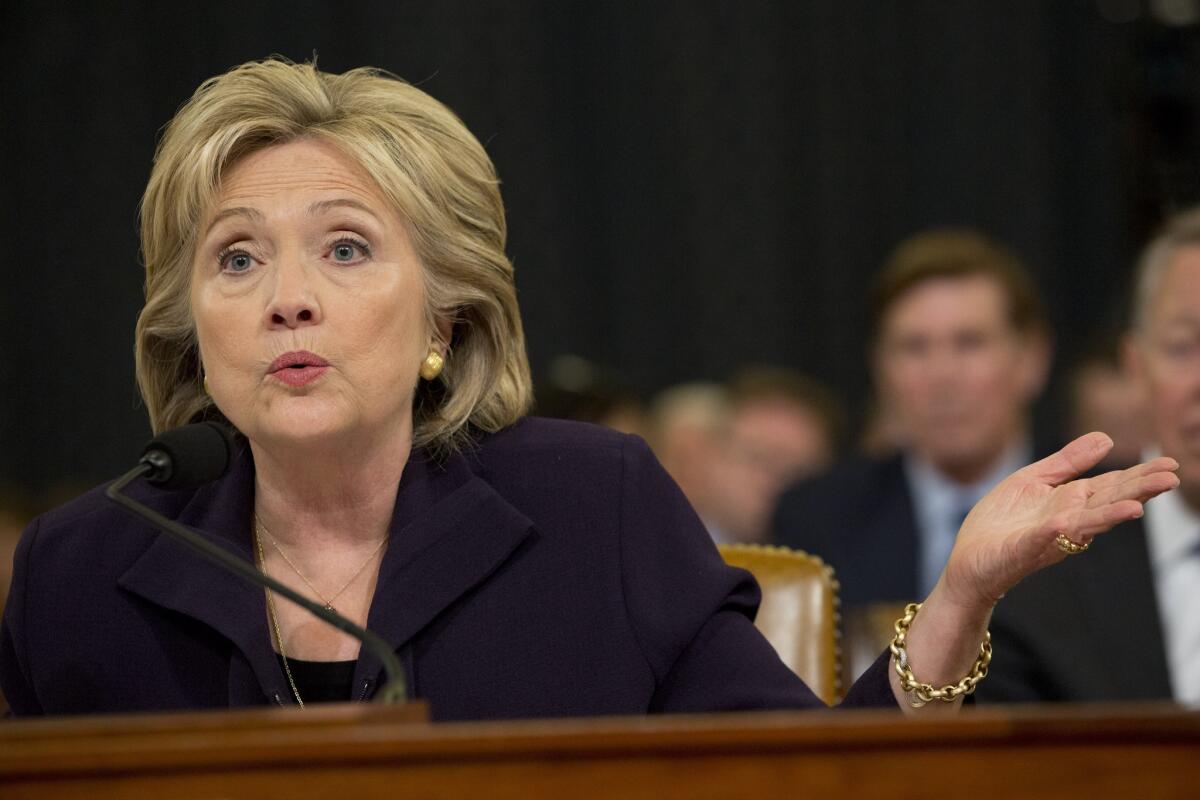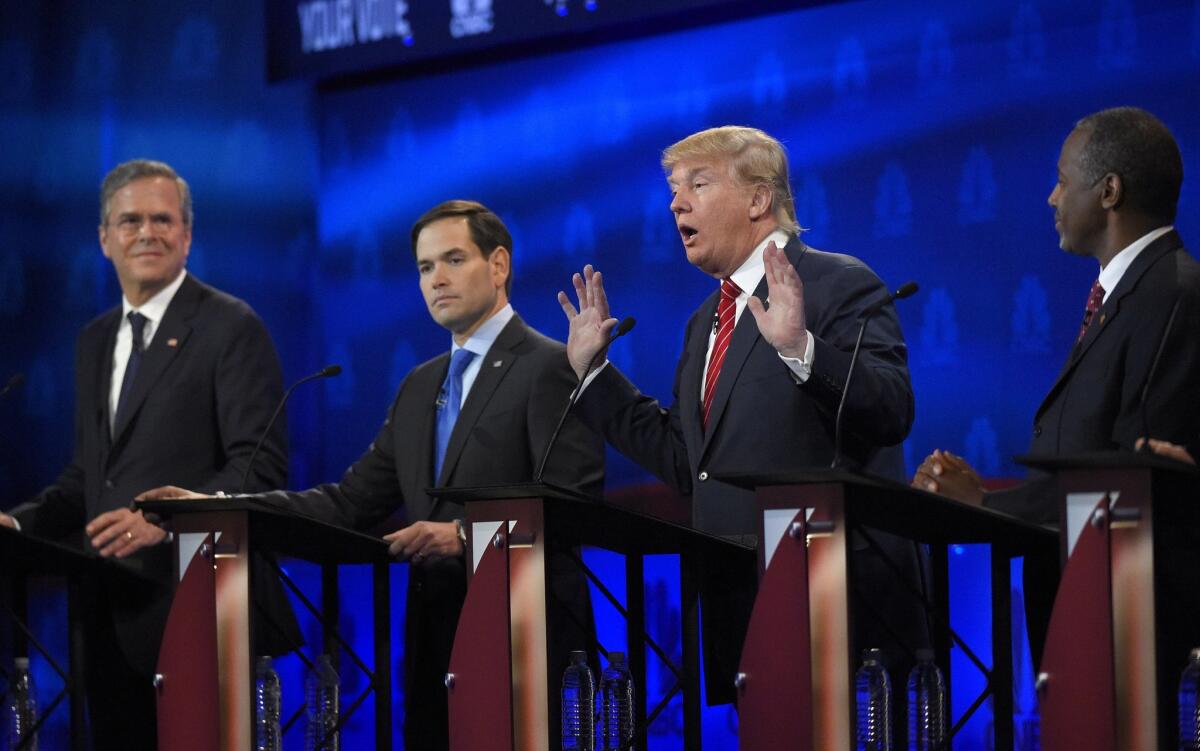Republicans suspend NBC debate amid anger over CNBC moderators
By the numbers
Welcome to Trail Guide, your daily host through the wilds of the 2016 presidential campaign. It's Friday, Oct. 30, and this is what we're watching:
- The Republican National Committee suspended a future debate on NBC, objecting to the tone of the questions from CNBC's moderators Wednesday
- More of Hillary Rodham Clinton's emails were released
- Jeb Bush campaigned in New Hampshire after a rough debate earlier in the week and amid questions about whether his campaign is imploding
- Clinton also netted grabbed New York Mayor Bill de Blasio's endorsement
Sean Hannity on Kevin McCarthy
Latest Clinton emails: Much like your inbox
The thousands of Hillary Rodham Clinton's emails from her time at the State Department that have been released this year have offered only a narrow window into how she conducted business as the nation's top diplomat.
But the latest set made public Friday did reveal, however, that her inbox is similar to everyone else's -- weird spam, personal attachment to her phone and, of course, that inbox stalwart, LinkedIn:
And wondering whether those close to you sent a very awkward email, or just got hacked:
Another batch of Hillary Clinton's emails is released

Hillary Rodham Clinton speaks during the final hour of her marathon testimony before the House Select Committee on Benghazi on Oct. 22.
Another 7,000 pages of government email Hillary Rodham Clinton sent or received through her personal server while serving as secretary of State were released to the public on Friday afternoon.
The Department of State has been under a court order to release the emails in monthly batches. The latest release includes messages that went through the server mostly in 2011 and 2012. With it, the department has now disclosed just over half of the material that will be publicly released.
It also has discovered another 268 emails sent through the server that have since been marked classified. A department spokesman said the material was not classified at the time Clinton sent or received it.
The thousands of pages of emails released so far have produced little insight into key decisions Clinton made while at the State Department. Clinton told the House Select Benghazi Committee last week that she rarely used email to conduct state business, and that she did not even have a computer in her office.
Nonetheless, Clinton’s private server did have some 55,000 messages on it. And some of them reflect some interesting and revealing exchanges, including those with confidants like Sidney Blumenthal, a former Bill Clinton White House official whom the Obama administration had banned from working at the StateDepartment. Clinton nonetheless was receiving voluminous advice from Blumenthal on how to navigate policy on Libya.
The latest batch of Clinton email released by State can be searched here.
A complete database of the Clinton emails released to date can be found here.
Rubio picks up GOP donor funds after debate
Marco Rubio’s performance in Wednesday’s debate was strong enough to get thousands of donors to open their wallets.
Rubio outmatched fellow Floridian Jeb Bush in a confrontation that was one of the debate’s signature moments, prompting about 14,000 supporters to donate. Rubio raised about $750,000 online by Thursday afternoon, according to Politico.
During the debate, Bush tried to challenge Rubio about his poor Senate attendance, but Rubio successfully ignored his rival’s attempts to elicit a response about his commitment to his day job. Bush’s failed gambit was the latest in a series of missteps by his campaign, prompting questions about the future of his candidacy.
"I think the governor himself will tell you, for whatever reason, his debate performances have not been consistent with his performances throughout the campaign," said Al Cardenas, a longtime Bush friend and supporter.
Clinton earns the backing of New York's mayor
New York Mayor Bill de Blasio's 2013 victory in a crowded primary field was seen as an early sign of the strength of the progressive movement.
On Friday, after a conspicuous delay, de Blasio had a message to party activists who have been flirting with Sen. Bernie Sanders in the Democratic race for president: "I'm endorsing Hillary Clinton enthusiastically."
"We have to take on income inequality. It's the issue of our time," he said on MSNBC's "Morning Joe." "We have to restore the middle class, and Hillary Clinton knows how to do it, will get it done and has a progressive platform that speaks to all the changes we need."
De Blasio ran Clinton's first campaign for elected office, her 2000 bid for the U.S. Senate as a transplanted New Yorker. Both she and former President Clinton attended de Blasio's inauguration as mayor in 2014.
But he'd held off on formally endorsing Clinton for months. In an appearance on NBC's "Meet The Press" on the day Clinton was to announce her candidacy, de Blasio said he wanted to "see a vision" from her and other candidates about where they would take the country.
De Blasio has sought to use his platform as mayor of the nation's largest city to boost what he's called "the progressive agenda," a blueprint for left-leaning government national that calls for policies like raising the minimum wage to $15 an hour, enacting paid sick and family leave and universal pre-K.
Clinton has backed some, but not all of those proposals. For instance, she's indicated support for a slightly lower national minimum wage to account for the lower cost of living outside urban areas like New York.
De Blasio praised Sanders for helping to move the national discussion "in a very productive way." But he said he was "extremely pleased" with the proposals Clinton has put forth so far.
"With each successive speech, Hillary has filled in the blanks forcefully and not just on economics — on things like mass incarceration, very passionately, voting rights, constitutional amendments to end the effects of Citizens United. This is a very fulsome, progressive platform," he said.
On Friday, Clinton is unveiling additional steps as part of that platform, focused on criminal justice issues.
During a campaign stop in Atlanta, she's proposing ending a sentencing disparity for crack and powder cocaine and legislation to ban racial profiling by law enforcement. She'll also announce plans to take executive action to "ban the box," barring the federal government and contractors from screening out former prisoners at the earliest stages of application processes.
Clinton expressed some support for the idea this year at a campaign appearance in New Hampshire.
All three proposals are part of a criminal justice reform that expands on ideas she outlined in New York earlier in her campaign.
Still angry over CNBC debate, GOP suspends upcoming NBC faceoff

Donald Trump, second from right, speaks as Jeb Bush, left, Marco Rubio, second from left, and Ben Carson look on during the CNBC Republican presidential debate at the University of Colorado.
Republicans took their revenge today against what they called a presidential debate full of “inaccurate or downright offensive” questions by suspending a future session planned with NBC News.
Reince Priebus, chairman of the Republican National Committee, has been under pressure from candidates and core supporters to take more control over the process, following CNBC’s debate Wednesday night.
His letter to NBC News on Friday conceded that the network has no direct journalistic control over CNBC, a financial network owned by the parent company, “but the network is an arm of your organization.”
Priebus stopped short of canceling the NBC/Telemundo debate, scheduled for Feb. 26 at the University of Houston, and may be seeking leverage in changing the debate rules or sending a signal to other debate hosts that the tone of questioning must change.
“We simply cannot continue with NBC without full consultation with our campaigns,” Priebus wrote.
NBC News appeared to seize on that opening in its response, which called the suspension a “disappointing development” but promised to work with Telemundo, which is owned by NBCUniversal, to “in good faith to resolve this matter with the Republican Party.”
The debate is also important to the Republican Party’s goal of reaching out to Latino viewers, giving the network some added leverage.
Despite complaints that the CNBC moderators were unnecessarily combative, several candidates appear to have benefited by criticizing their questions. Sens. Ted Cruz of Texas and Marco Rubio of Florida and New Jersey Gov. Chris Christie used critiques of the debate’s tone to their rhetorical advantage, winning applause from the live audience in Boulder, Colo. Each claims to have garnered significant donations from supporters as a result.
Here’s a full copy of the letter and NBC’s response:
Mr. Andrew Lack
Chairman, NBC News
30 Rockefeller Plaza
New York, New York 10112
Dear Mr. Lack,
I write to inform you that pending further discussion between the Republican National Committee (RNC) and our presidential campaigns, we are suspending the partnership with NBC News for the Republican primary debate at the University of Houston on February 26, 2016. The RNC’s sole role in the primary debate process is to ensure that our candidates are given a full and fair opportunity to lay out their vision for America’s future. We simply cannot continue with NBC without full consultation with our campaigns.
The CNBC network is one of your media properties, and its handling of the debate was conducted in bad faith. We understand that NBC does not exercise full editorial control over CNBC’s journalistic approach. However, the network is an arm of your organization, and we need to ensure there is not a repeat performance.
CNBC billed the debate as one that would focus on “the key issues that matter to all voters—job growth, taxes, technology, retirement and the health of our national economy.” That was not the case. Before the debate, the candidates were promised an opening question on economic or financial matters. That was not the case. Candidates were promised that speaking time would be carefully monitored to ensure fairness. That was not the case. Questions were inaccurate or downright offensive. The first question directed to one of our candidates asked if he was running a comic book version of a presidential campaign, hardly in the spirit of how the debate was billed.
While debates are meant to include tough questions and contrast candidates’ visions and policies for the future of America, CNBC’s moderators engaged in a series of “gotcha” questions, petty and mean-spirited in tone, and designed to embarrass our candidates. What took place Wednesday night was not an attempt to give the American people a greater understanding of our candidates’ policies and ideas.
I have tremendous respect for the First Amendment and freedom of the press. However, I also expect the media to host a substantive debate on consequential issues important to Americans. CNBC did not.
While we are suspending our partnership with NBC News and its properties, we still fully intend to have a debate on that day, and will ensure that National Review remains part of it.
I will be working with our candidates to discuss how to move forward and will be in touch.
Sincerely,
Reince Priebus
Chairman, Republican National Committee
STATEMENT FROM NBC NEWS
“This is a disappointing development. However, along with our debate broadcast partners at Telemundo, we will work in good faith to resolve this matter with the Republican Party.”
Bill de Blasio endorses Hillary Clinton
Chris Christie tangles with a favorite adversary: the media
By the numbers
Get the L.A. Times Politics newsletter
Deeply reported insights into legislation, politics and policy from Sacramento, Washington and beyond. In your inbox three times per week.
You may occasionally receive promotional content from the Los Angeles Times.







